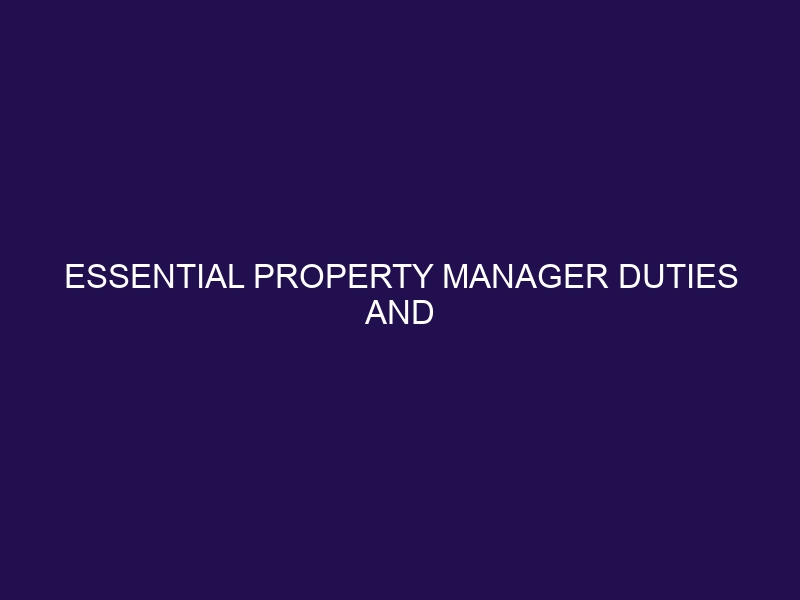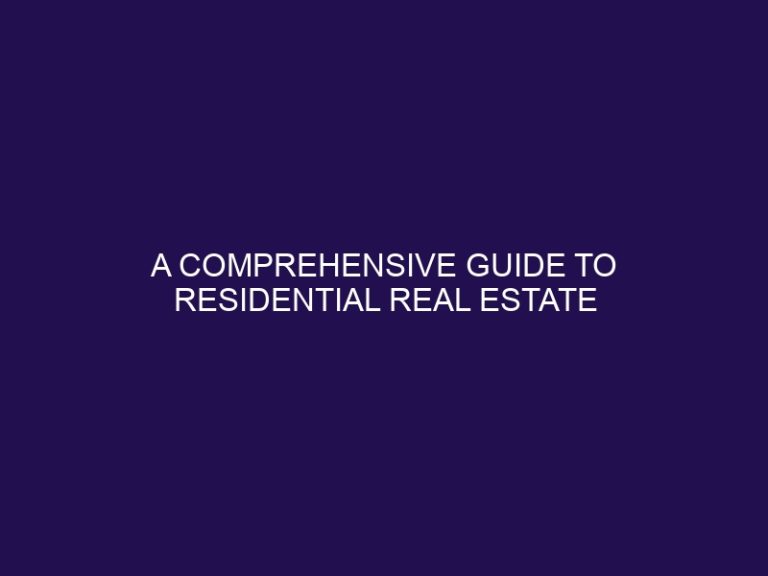Essential Property Manager Duties and Responsibilities To Know Before Hiring
Before hiring a property manager, it is crucial to understand the essential duties and responsibilities they have. A property manager plays a vital role in overseeing and managing properties on behalf of owners or property management companies. They act as the intermediary between landlords and tenants, ensuring the smooth operation and maintenance of rental properties. Understanding the key responsibilities of a property manager is essential to ensure you make an informed decision when hiring one.
Property managers are responsible for various tasks, including marketing and advertising vacant rental properties. They utilize effective strategies to attract prospective tenants, such as online listings, social media marketing, and collaborating with real estate agents.
Tenant screening and selection is another crucial responsibility of a property manager. They conduct background checks, verify employment and rental history, and assess tenant qualifications to find reliable and responsible individuals.
Lease agreement and rent collection are integral components of a property manager’s duties. They draft and enforce lease agreements, outlining the rights and obligations of both landlords and tenants. Rent collection is also managed by property managers, ensuring timely payments and addressing any payment-related issues.
Property maintenance and repairs are critical responsibilities that property managers handle. They coordinate maintenance requests, address repairs promptly, and ensure the property is well-maintained and in a safe condition for tenants.
Financial reporting and budgeting are essential for property managers to keep track of income, expenses, and overall financial aspects of the property. They prepare financial reports, monitor budget allocations, and optimize financial performance.
Legal compliance is a crucial aspect of property management. Property managers need to stay updated with relevant laws and regulations governing rental properties. They ensure compliance with fair housing laws, safety codes, property disclosures, and eviction procedures.
By understanding the duties and responsibilities of a property manager, you can hire the right professional who can effectively manage your property, ensure tenant satisfaction, and maintain your investment’s value.
What is a Property Manager?
A property manager is an individual or professional company responsible for overseeing and managing real estate properties on behalf of the owner. What is a Property Manager? They handle various tasks related to the property, ensuring its smooth operation and profitability. Some key duties of a property manager include rent collection, maintenance and repairs, tenant screening and selection, lease enforcement, and financial reporting. Property managers serve as a liaison between the owner and tenants, handling any disputes or issues that may arise. Pro-tip: When hiring a property manager, consider their experience, reputation, and ability to effectively communicate and handle responsibilities.
What Are the Key Responsibilities of a Property Manager?
The key responsibilities of a property manager involve marketing and advertising rental properties, screening and selecting tenants, managing lease agreements and rent collection, handling property maintenance and repairs, preparing financial reports and budgets, ensuring legal compliance, and more. Property managers are responsible for effectively marketing properties to attract tenants, conducting thorough tenant screening processes, maintaining lease agreements and collecting rent, responding to maintenance requests, preparing financial reports, and staying knowledgeable about relevant laws and regulations. These responsibilities ensure that properties are well-maintained, tenants are satisfied, and financial and legal obligations are met. What Are the Key Responsibilities of a Property Manager?
Marketing and Advertising
- To effectively market and advertise properties, property managers should consider the following strategies:
- Create an online presence by utilizing social media platforms, property listing websites, and a professional website.
- Develop a comprehensive marketing plan, including targeted advertising campaigns and promotions.
- Utilize professional photography and virtual tours to showcase the property’s unique features.
- Implement search engine optimization techniques to improve online visibility.
- Engage with potential tenants through personalized and timely responses to inquiries.
- Utilize traditional advertising methods, such as flyers, signage, and print media, in local communities.
- Cultivate relationships with local real estate agents and relocation companies to expand the property’s market reach.
How Does a Property Manager Market Rental Properties?
How Does a Property Manager Market Rental Properties?
Property managers employ various techniques to effectively market rental properties and attract potential tenants. Here are the steps they follow:
- Create compelling property listings highlighting key features and amenities.
- Use professional photography to showcase the property’s appearance and appeal.
- Utilize online rental platforms and websites to reach a wider audience.
- Advertise through social media platforms and targeted online advertisements.
- Network with local real estate agents and brokers to spread the word about available rentals.
- Host open houses or virtual tours to allow interested tenants to view the property.
- Respond promptly to inquiries and schedule property showings at convenient times.
Historically, property managers employed traditional marketing methods such as print ads and signage. However, with the rise of digital platforms, online advertising has become the most effective way to market rental properties. By combining both traditional and digital marketing strategies, property managers can maximize exposure and increase the chances of finding suitable tenants.
What Are the Best Advertising Platforms for Property Managers?
What Are the Best Advertising Platforms for Property Managers?
When it comes to advertising rental properties, property managers have several effective platforms to choose from. Here are some of the best advertising platforms for property managers:
- Online listing websites: Websites like Zillow, Trulia, and Apartments.com are popular choices for advertising rental properties. They attract a large number of potential tenants.
- Social media: Platforms like Facebook, Instagram, and Twitter can be utilized to reach a wider audience. Property managers can create targeted ads and promote their listings to specific demographics.
- Local newspapers and magazines: Advertising in local publications can be beneficial for reaching tenants who prefer traditional methods of searching for rentals.
- Word of mouth: Property managers can harness the power of referrals by encouraging satisfied tenants to spread the word about available properties.
By utilizing these advertising platforms, property managers can effectively market their rental properties and attract potential tenants.
Tenant Screening and Selection
- Application: Tenant Screening and Selection begins with collecting detailed rental applications to gather necessary information about potential tenants.
- Credit Check: As an important part of Tenant Screening and Selection, property managers should run credit checks to assess applicants’ financial history and determine their ability to pay rent on time.
- Background Check: Another crucial step in Tenant Screening and Selection is to conduct background checks to verify identity, screen for criminal records, and assess rental history.
- Employment Verification: Property managers should verify applicants’ employment status and stability as part of the Tenant Screening and Selection process to assess their income and job security.
- Interview: Conducting interviews is an integral component of Tenant Screening and Selection. It helps property managers gauge applicants’ personalities, communication skills, and compatibility with the property community.
True story: One property manager conducted thorough Tenant Screening and Selection for a vacant apartment. After rejecting several applicants due to red flags found during the process, they finally selected a responsible tenant who paid rent on time and maintained the property impeccably throughout their tenancy.
What is the Importance of Tenant Screening?
What is the Importance of Tenant Screening?
Tenant screening is a crucial step in the property management process. It is important to understand the importance of tenant screening as it helps to ensure that responsible and reliable tenants are selected for rental properties. By screening tenants, property managers can minimize the risk of potential problems such as late payments, property damage, or eviction. The importance of tenant screening lies in the fact that it involves conducting background checks, verifying employment and income, checking credit history, and contacting references. This comprehensive process helps property managers make informed decisions about potential tenants and protects the property owner’s investment. The importance of tenant screening cannot be emphasized enough as it plays a vital role in maintaining the integrity and profitability of rental properties.
What Are the Steps in Tenant Screening?
- When it comes to tenant screening, there are several important steps that property managers should follow to ensure they choose the right tenants for their rental properties.
- Application Process: Require prospective tenants to fill out a detailed rental application that includes personal information, rental history, and income verification.
- Background Check: Conduct a thorough background check, including criminal and credit history, to assess the tenant’s trustworthiness and financial stability.
- Reference Checks: Reach out to previous landlords and personal references provided by the tenant to gain insights into their behavior and reliability as a tenant.
- Income Verification: Verify the tenant’s income through pay stubs, bank statements, or employment verification to ensure they can afford the rent.
- Eviction Search for any past eviction records to determine if the tenant has a history of problematic tenancies.
By following these steps in tenant screening, property managers can make informed decisions and secure responsible tenants for their rental properties.
Lease Agreement and Rent Collection
When hiring a property manager, it’s important to understand their responsibilities regarding lease agreements and rent collection.
- Lease Agreements: A property manager should draft legally binding lease agreements that protect both the landlord and the tenant. These agreements should cover terms, conditions, and any additional clauses agreed upon.
- Rent Collection: The property manager is responsible for collecting rent from tenants on time. They should establish a reliable system for rent collection, including setting up payment methods and enforcing late payment penalties if necessary.
A property manager once faced a challenging situation when a tenant consistently failed to pay rent. With proper documentation and legal procedures in place, the property manager successfully evicted the tenant and found a new, responsible tenant to ensure consistent rent collection.
What Should Be Included in a Lease Agreement?
A lease agreement should include crucial details to protect both the landlord and the tenant. It is essential to clearly state the parties involved, including their names and contact information. The lease agreement should also describe the property being leased, including the address and any specific areas or amenities included. The terms of the lease, such as the duration and renewal or termination conditions, should be specified. Rent and payment terms should be clearly stated, including the amount of rent, due date, acceptable payment methods, and consequences for late or missed payments. Additionally, the agreement should outline the amount of the security deposit, its return terms, and any allowable deductions. The responsibilities for repairs and maintenance of the property should be defined for both the landlord and the tenant. It is important to include any specific rules or restrictions that the tenant must abide by, such as noise restrictions or pet policies. The lease agreement should also specify which utilities or expenses the tenant is responsible for, such as electricity, water, or HOA fees. Furthermore, any necessary legal disclosures such as lead paint disclosures or information about registered sex offenders in the area should be included. Finally, to make the lease agreement legally binding, it is crucial for both the landlord and the tenant to sign and date the document.
What Are the Methods of Rent Collection?
What Are the Methods of Rent Collection?
Property managers have various methods of rent collection to ensure a smooth and efficient process. Here are some common methods:
- Traditional methods: Property managers may collect rent through traditional methods such as checks, money orders, or cash.
- Online payments: Many property managers offer the convenience of online rent payment systems, allowing tenants to pay electronically through platforms like PayPal or online banking.
- Automatic deductions: Some property managers set up automatic deductions from tenants’ bank accounts, ensuring timely rent collection without the need for manual payments.
- Payment kiosks: Property managers may install payment kiosks at their office or the property itself, enabling tenants to make cash or card payments in person.
Pro-tip: Encourage tenants to utilize online payment options for convenience and efficiency, reducing the risk of delayed or lost payments.
Property Maintenance and Repairs
Property maintenance and repairs are crucial responsibilities for property managers to ensure the upkeep and functionality of the properties they oversee. Property Maintenance and Repairs are key points to consider. Here are some key points to consider:
Effective Property Maintenance and Repairs and timely Property Maintenance and Repairs are essential for maintaining the value and functionality of the property. By prioritizing these tasks, property managers can ensure tenant satisfaction and attract prospective tenants.
How Does a Property Manager Handle Maintenance Requests?
How Does a Property Manager Handle Maintenance Requests?
When handling maintenance requests, a property manager follows a systematic approach to ensure efficient resolution and tenant satisfaction. Here are the steps a property manager typically takes:
- Receive and document the maintenance request.
- Prioritize the request based on its urgency and severity.
- Notify the appropriate maintenance personnel or contractors.
- Schedule a time for the maintenance to be carried out.
- Communicate with the tenant regarding the scheduled maintenance and any necessary preparations.
- Supervise and inspect the completed work to ensure quality and tenant satisfaction.
- Update maintenance records and keep track of expenses.
In a similar situation, a property manager received a maintenance request regarding a leaky faucet from a tenant. The manager promptly acknowledged the request, scheduled a licensed plumber, and ensured the repair was completed within 24 hours. The tenant was pleased with the quick response and appreciated the property manager’s efficiency in addressing the issue.
What are the Common Maintenance Responsibilities of a Property Manager?
“`
- Maintaining the Property: A property manager is responsible for ensuring that the property is well-maintained. This includes regular inspections, addressing repairs and maintenance issues promptly, and overseeing landscaping and cleaning.
- Responding to Maintenance Requests: When tenants report maintenance issues, it is the property manager’s duty to address them in a timely manner. This involves coordinating with vendors or contractors to get repairs done and ensuring tenant satisfaction.
- Preventive Maintenance: Property managers should schedule regular maintenance tasks to prevent major issues from occurring. This may include servicing HVAC systems, checking for leaks or pests, and maintaining common areas.
- Emergency Repairs: In case of emergencies like floods or electrical failures, the property manager must have a plan in place to address the situation quickly and efficiently. This may involve contacting emergency services or arranging emergency repairs.
- Inspecting Move-in/Move-out: When tenants move in or move out, the property manager should conduct inspections to document the condition of the property. This helps determine any damages that need to be addressed or deducted from the security deposit.
Common Maintenance Responsibilities of a Property Manager include maintaining the property by regularly inspecting it, addressing repairs and maintenance issues promptly, and overseeing landscaping and cleaning. They are also responsible for responding to maintenance requests from tenants in a timely manner, coordinating with vendors or contractors to get repairs done, and ensuring tenant satisfaction. Property managers should schedule preventive maintenance tasks to prevent major issues, such as servicing HVAC systems, checking for leaks or pests, and maintaining common areas. In case of emergencies like floods or electrical failures, property managers must have a plan in place to address the situation quickly and efficiently, which may involve contacting emergency services or arranging emergency repairs. Additionally, when tenants move in or move out, property managers should conduct inspections to document the condition of the property, helping determine any damages that need to be addressed or deducted from the security deposit.
Financial Reporting and Budgeting
Financial reporting and budgeting are crucial responsibilities for property managers, as they play a vital role in ensuring transparent financial operations and efficient allocation of resources. These tasks encompass several key aspects:
- Tracking Income and Expenses: Property managers must accurately record and categorize all income and expenses associated with the property.
- Preparing Financial Reports: Regular generation of essential reports, such as income statements and balance sheets, is necessary to provide stakeholders with a comprehensive overview of the property’s financial health.
- Analyzing Financial Data: By utilizing financial reports, property managers can identify trends, evaluate performance, and make well-informed decisions regarding budgeting and cost management.
- Budget Planning: Collaborating with stakeholders, property managers develop annual budgets that outline projected income, expenses, and capital expenditures.
- Monitoring Variance: Regularly monitoring actual expenses against the budget enables property managers to identify any discrepancies and take appropriate corrective actions.
Effective financial reporting and budgeting are paramount for property managers as they help optimize financial performance and ensure the overall success of the property.
What Financial Reports Should a Property Manager Prepare?
A property manager should prepare various financial reports to effectively manage rental properties. These reports help track the financial performance, ensure profitability, and make informed decisions. So, what financial reports should a property manager prepare? Here are the key financial reports:
- Income statement: This report shows the rental income, expenses, and net operating income.
- Balance sheet: It provides a snapshot of the property’s financial position, including assets, liabilities, and owner’s equity.
- Cash flow statement: This report tracks the cash inflows and outflows, highlighting the property’s ability to generate positive cash flow.
- Profit and loss statement: It summarizes the property’s revenue, expenses, and net profit (or loss) over a specific period.
- Rent roll: This report lists all the rental units, their occupancy status, rental rates, and lease terms.
Preparing and analyzing these financial reports allows property managers to assess the property’s financial health, identify areas for improvement, and make strategic decisions to maximize profitability.
How Does a Property Manager Set and Manage a Budget?
To set and manage a budget, a property manager follows a series of steps:
-
Analyze Expenses: Review all expenses associated with property management, such as maintenance, repairs, utilities, and advertising.
-
Estimate Income: Calculate the expected rental income and any additional revenue sources from the property.
-
Create a Budget Plan: Develop a comprehensive budget plan that includes monthly expenses, quarterly expenses, and annual expenses.
-
Allot Funds: Assign specific amounts for each expense category to ensure proper allocation of funds.
-
Monitor Expenses: Regularly track and monitor expenses to identify any discrepancies or areas where adjustments are needed.
-
Adjust as Needed: Make necessary adjustments to the budget plan when unexpected expenses arise or changes in income occur.
-
Review and Evaluate: Periodically review and evaluate the budget plan to ensure it remains realistic and aligns with the property’s financial goals.
A property manager, John, diligently followed these steps to set and manage the budget for a residential complex. By accurately estimating income and tracking expenses, he successfully allocated funds for maintenance, advertising, and other necessary expenses. This proactive approach ensured the financial stability of the property and allowed for necessary improvements and repairs to be carried out promptly.
How Does a Property Manager Set and Manage a Budget?
Legal Compliance
Legal compliance is crucial for property managers as it is their essential responsibility. To ensure the smooth operation of the property and protect the rights of tenants, property managers must adhere to the various laws and regulations. There are key aspects of legal compliance that property managers need to incorporate:
1. Tenant screening: Property managers must abide by fair housing laws while screening potential tenants to ensure equal treatment and prevent any form of discrimination.
2. Lease agreements: Property managers are required to draft lease agreements that comply with local and state laws. These agreements should include tenant rights, responsibilities, and eviction procedures.
3. Maintenance and safety: It is the responsibility of property managers to ensure that the property meets all safety and health codes. Any necessary repairs should be promptly addressed to provide a secure living environment for the tenants.
4. Evictions: In the case of tenant violations or unpaid rent, property managers should follow the legal procedures for eviction. This ensures the protection of both tenant and landlord rights.
5. Financial management: Property managers must maintain accurate financial records, handle security deposits appropriately, and comply with tax regulations.
By maintaining legal compliance, property managers and tenants are protected, ensuring a fair and lawful rental experience.
What Laws and Regulations Should a Property Manager Be Aware Of?
Property managers must be well-versed in the laws and regulations that govern their role. It is essential for property managers to understand what laws and regulations they need to be aware of. Some crucial laws and regulations that a property manager should be familiar with include fair housing laws, landlord-tenant laws, building codes, and zoning regulations. By being knowledgeable about these laws and regulations, property managers can ensure they provide a safe and fair environment for tenants.
Fair housing laws play a significant role in preventing discrimination. These laws prohibit property managers from discriminating against tenants based on factors such as race, religion, or disability. By understanding and abiding by fair housing laws, property managers can uphold equal opportunities for all tenants.
Landlord-tenant laws are another vital aspect of a property manager’s responsibilities. These laws outline the rights and responsibilities of both the landlord and the tenant. With knowledge of landlord-tenant laws, property managers can effectively manage lease agreements, resolve conflicts, and maintain a positive landlord-tenant relationship.
Additionally, building codes and zoning regulations are crucial for property managers to be aware of. Building codes ensure that properties meet safety standards, protecting both tenants and the surrounding environment. Zoning regulations dictate how properties can be used, ensuring that land use is appropriate and in compliance with local planning regulations.
By incorporating these various laws and regulations into their knowledge base, property managers can navigate their role successfully. Adhering to these laws and regulations not only helps property managers avoid legal issues but also fosters a safe and fair environment for tenants.
How Can a Property Manager Ensure Legal Compliance?
How Can a Property Manager Ensure Legal Compliance?
To ensure legal compliance, property managers can take the following steps:
1. Stay Informed: Property managers should stay updated on relevant laws and regulations pertaining to rental properties. This includes keeping track of changes and updates to local, state, and federal laws.
2. Educate Themselves: Property managers should take the time to educate themselves about landlord-tenant laws, fair housing regulations, and other legal requirements. This can be done through courses, seminars, or by consulting legal professionals.
3. Create Legal Documents: Property managers should ensure that they have legally binding documents in place, such as lease agreements, that comply with relevant laws and regulations. It is important to consult legal counsel when drafting or revising these documents.
4. Conduct Regular Inspections: Property managers should regularly inspect the rental property to ensure compliance with health and safety regulations. This includes checking for any hazardous conditions and addressing them promptly.
5. Maintain Records: Keeping thorough and organized records is essential for legal compliance. Property managers should maintain detailed records of lease agreements, rental payments, repairs, and communication with tenants.
6. Respond Promptly: Property managers should respond promptly to any tenant concerns or complaints. This not only fosters good tenant relations but can also help address any potential legal issues before they escalate.
A property manager in a small town faced a discrimination lawsuit when it was alleged that they had violated fair housing laws. Fortunately, the property manager had attended fair housing training seminars and promptly responded to the complaint. They were able to provide evidence that they had followed the law and did not discriminate against any tenant. This proactive approach and adherence to legal requirements helped the property manager successfully resolve the issue and protect their reputation.
Frequently Asked Questions
1. What are the essential duties and responsibilities of a property manager?
Property managers are responsible for overseeing the daily operations of rental properties, including residential, multifamily, and commercial buildings. Their duties include responding to maintenance requests, reviewing inspection reports, processing security deposits, and overall problem solving.
2. What qualities should I look for when hiring a property manager?
When hiring a property manager, it is important to look for individuals with strong financial knowledge, exceptional communication skills, and organizational skills. These qualities will ensure that the property manager can effectively protect investments, ensure tenant satisfaction, and increase property value.
3. How can a property manager contribute to the long-term profitability of my property?
A property manager can contribute to the long-term profitability of your property by implementing strategic planning, such as rent optimization and cost-effective measures to control expenses. They can also ensure that the property’s amenities are well-maintained and attractive to potential tenants, reducing rental vacancies and maximizing rental income.
4. What role does a property manager play in maintaining positive tenant relationships?
A property manager acts as a bridge between property owners and tenants, using their expertise to maintain and enhance the value of the property over time. They can handle day-to-day operations, address tenant concerns, and maintain clear communication, creating a positive tenant experience and fostering good relationships.
5. How can a property manager help me find ideal tenants?
A property manager can help you find ideal tenants by conducting thorough tenant screenings, including background checks, credit checks, and rental history verification. They can also use their knowledge of the property market data and surrounding area averages to set an appropriate rent price, attracting tenants who align with your property’s requirements.
6. What should I consider when choosing a property management company?
When choosing a property management company, consider their experience, reputation, and track record of success. Ensure that they have sufficient manpower and a high-performing team to handle your property’s daily tasks. Also, make sure they are knowledgeable about the relevant regulations and laws, such as the Fair Housing Act, to ensure compliance and protect your investment.







